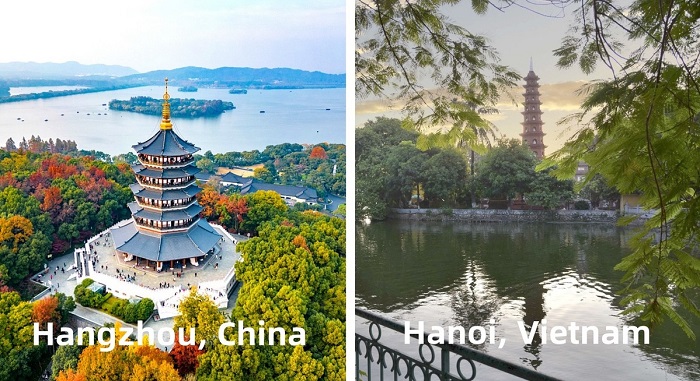Dame Jessica Rawson: Unearthing ancient Chinese wisdom through cultural relics
In the long corridors of history, some dedicate their lives to unveiling the mysteries of bygone civilizations. Dame Jessica Rawson, a distinguished British art historian, archaeologist, and sinologist, is one of the most authoritative and representative experts in Western academia specializing in ancient Chinese culture and archaeology. With over four decades dedicated to oriental antiquities, her contributions are unparalleled.
Rawson has served as a professor of Chinese art and archaeology at the University of Oxford. She is a fellow of the British Academy, a consultant to the Palace Museum in Beijing, and an honorary professor at Peking University and the China Academy of Art in Hangzhou. Her previous roles include head of the Department of Oriental Antiquities at the British Museum and pro vice-chancellor and warden of Merton College, University of Oxford, the first female warden in its seven-century history. In 2022, she was awarded the Tang Prize in Sinology, recognizing her outstanding contributions to the field.
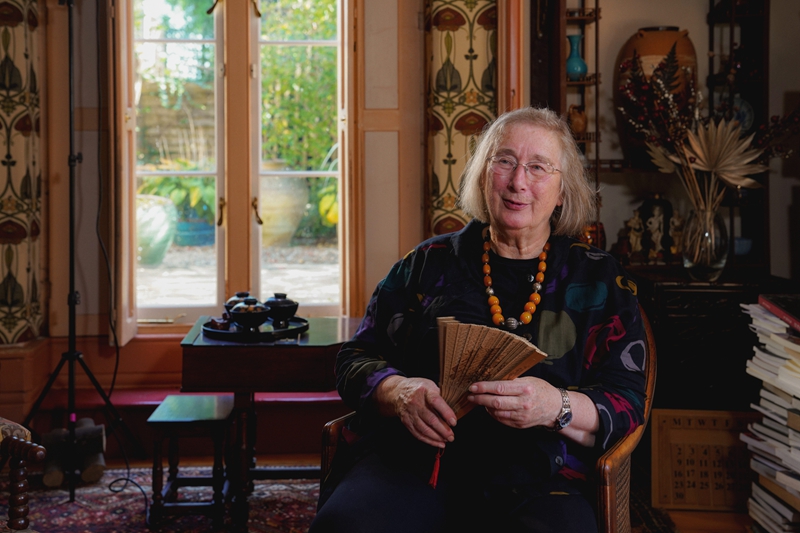
Professor Dame Jessica Rawson (Photo/Keng Huang)
From a young age, Rawson has been captivated by the distant civilization of China. Her 27 years at the British Museum allowed her to examine Chinese artifacts and compare them with global collections, gaining rich academic experience. Since the 1970s, she has visited China dozens of times, conducting research at significant archaeological sites like Sanxingdui and Liangzhu. She has delved into the historical and cultural significance of unearthed artifacts from tombs from various dynasties. Her latest book, "Life and Afterlife in Ancient China," published in 2023, offers fresh perspectives on ancient Chinese civilization based on China's latest archaeological discoveries.
In an exclusive interview with People's Daily Online, Rawson shared her early travels in China, meticulous research on Chinese cultural heritage, and in-depth exploration of Chinese civilization. Her expertise in Chinese art and archaeology, especially in areas such as bronze vessels from the Shang and Zhou Dynasties and tombs of the Han Dynasty, has spurred Western interest in ancient Chinese culture and art. Her work has enhanced Western understanding of China and underscored the importance of promoting dialogue and exchanges between different civilizations.
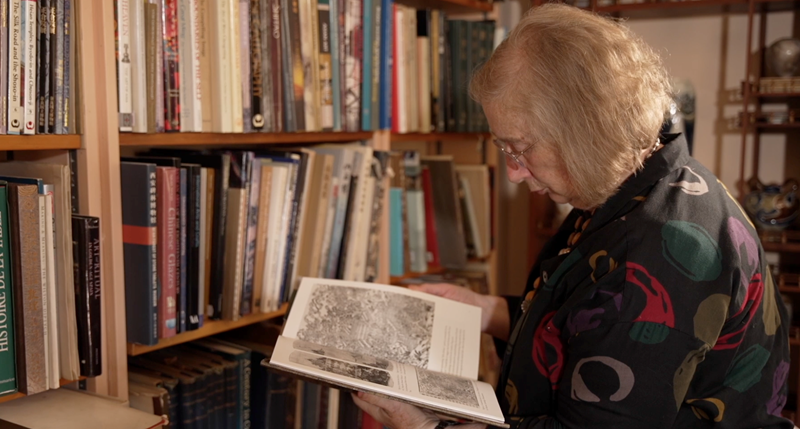
Professor Dame Jessica Rawson (Photo/Keng Huang)
The Chinese connection cultivated by the British Museum
People's Daily Online: When did you first encounter Chinese characters?
Jessica Rawson: I first noticed or was introduced to Chinese characters by my parents. I was probably 8 or 10 years old when they took me to the British Museum to see the Rosetta Stone. I was thrilled to see that there was a language written almost in pictures or signs, unlike our language, which I couldn't spell.
So, then my parents said, "Well, if you're interested in this, why not look at Chinese characters?" They gave me a small book titled "Teach Yourself Chinese." I don't think someone aged 10 can really learn to teach themselves Chinese from this little book. But I started to copy the Chinese characters into a notebook when I was that sort of age. And then, I looked at pictures of China with pagodas and willows. These are things that you see on dishes in Britain, borrowing from China but greatly changed. So, at a very young age, I was interested in what this place with this unique script was.
People's Daily Online: How did you later go about learning Chinese?
Jessica Rawson: I really wanted to study Chinese and Chinese objects, so I applied to the British Museum. And, fortunately, I was able to be appointed. So, I went to the British Museum in 1968. At SOAS, I took a degree in Chinese language and literature while I had a job at the British Museum. By the end of the degree, I could kind of read a brief archaeological report, but only just. It took a long time to develop more familiarity.
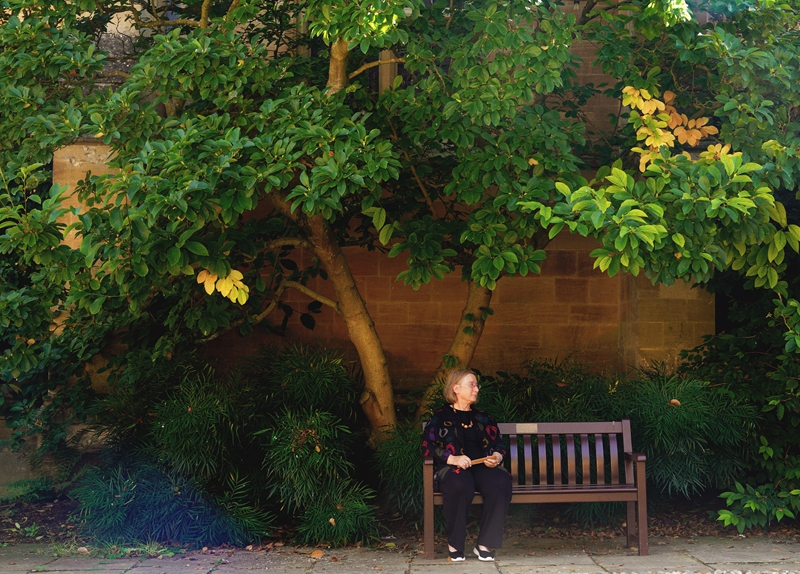
Professor Dame Jessica Rawson in Merton College, where she was warden between 1994 and 2010. (Photo/Keng Huang)
Unveiling the mysteries of ancient China
People's Daily Online: What major changes have you observed or experienced since your first visit to China?
Jessica Rawson: Beijing in 1975 was my first visit when I was in my 30s. China is very beautiful, especially if you know the parts I've been to — the vast open countryside, the huge mountains, the Loess Plateau, and the cities on the edge of Inner Mongolia. You know, those are all remarkable areas. I've enjoyed seeing so much of China. I think the one thing that's unusual about me is not really that I've traveled for over 40 years, but that I've been to so many different places and appreciate the geography, the climate, the different crops, and the different lifestyles. One thing that Western audiences lack is an understanding of the size of China, the different range of lifestyles, the different people, and the different levels of wealth and poverty. Over my visits, China has become much more urbanized.
People's Daily Online: In 1996, you organized a memorable exhibition called "The Mystery of Ancient China." Could you talk about how this exhibition was received then and share your memories?
Jessica Rawson: I wrote the catalog with assistance from other people. It was a dramatic exhibition, I think, because it made me and many others realize that China was much more complicated than they had thought. The most dramatic items in the exhibition were the bronzes from Sanxingdui, where there are now some very new discoveries. Everybody realized that this site was contemporary with the Shang Dynasty (1600-1046 B.C.), but it was clearly not part of the Shang Dynasty state. Indeed, it was something completely different. I think Liangzhu and Sanxingdui are areas that reveal jades, bronzes, and ideas that people had never seen before or never paid attention to. You can see from the material that these peoples had beliefs and ways of life and practices that were very clearly based on their own regions and had nothing to do, indeed, with other parts of China at that moment in time. Yours is a huge country. It's not surprising that it starts off with different regions, each with different strengths and ideas.
Chinese antiquity sweeps through Western academia
People's Daily Online: You have extensively researched various Chinese dynasties. Could you share some of your work's most fascinating discoveries or insights?
Jessica Rawson: I've done different things at different times. My specialty is the Shang and Zhou periods, down to the Han. I've also written about and been excited by the Tang Dynasty and why and how the Chinese of the Tang Dynasty imitated the ceramics of Western Asia. That, I think, is fascinating. It was a time when China had a lot of trading connections with Western Asia.
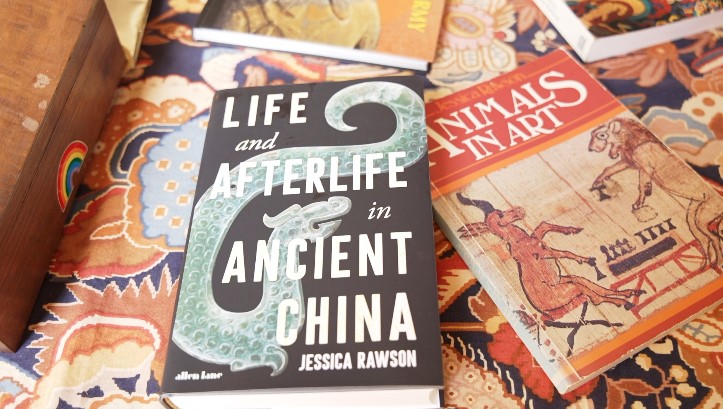
Professor Dame Jessica Rawson's new book, "Life and Afterlife in Ancient China." (Photo/Keng Huang)
People's Daily Online: Which area of China does your new book primarily focus on?
Jessica Rawson: This new book is about tombs, and the tombs would make no sense if we didn't think that the ancestors were important to their descendants. It's much more dramatic in these ancient periods, but there are also large tombs for the Ming and Qing emperors. The dominant belief is that a family must offer respect and sustenance to their ancestors. So, they built tombs with valuable contents.
I had not thought about these ideas in such depth before I wrote this book. But then I looked at all these tombs and realized that the people who built them, and I'm talking about the Shang, Zhou, Qin, and Han periods, really did want to make a good afterlife for their ancestors. And so, it's this which has taught me much more about China.
I think what people need to understand, if they can, is that there are many different regions, and the regions have different histories, different customs, and even today, quite different food and almost different dialects. What I started to think about most when writing this book is that China has a different social system from the West. In China, the major unit of society is the family. It can be a very large family, what we would call a clan, with many branches and many married sons and daughters, or it can nowadays be quite a narrow unit. In any case, the most important feature is the hierarchy of generations. So, if you're a son, you can't replace your father or take his position. China has a much stronger attachment to hierarchy than the West.
People's Daily Online: From the 1960s until now, based on your knowledge of Oxford, do you think more people are studying Chinese?
Jessica Rawson: Definitely, more people are studying China. So, anthropology, politics, particularly modern and contemporary China, and Chinese history. There weren't many Chinese historians in the 1960s. I think the subject has expanded from being one that was quite confined to a language teaching department, where classical Chinese was emphasized at both Cambridge and Oxford, to nowadays, where many universities have academics and students interested in contemporary China. There are also people who are scientists from China who are either Chinese nationals or ethnically Chinese. They're teaching in Western universities. So, China has opened up in all sorts of ways.
-
China and Vietnam share legend of West Lake
December 11, 2023
-
Hangzhou named 'China's most livable city' for 2023
November 27, 2023
-
Hangzhou achieves megacity status
November 15, 2023
-
BRI 10 YEARS ON: Road to prosperity
October 16, 2023


